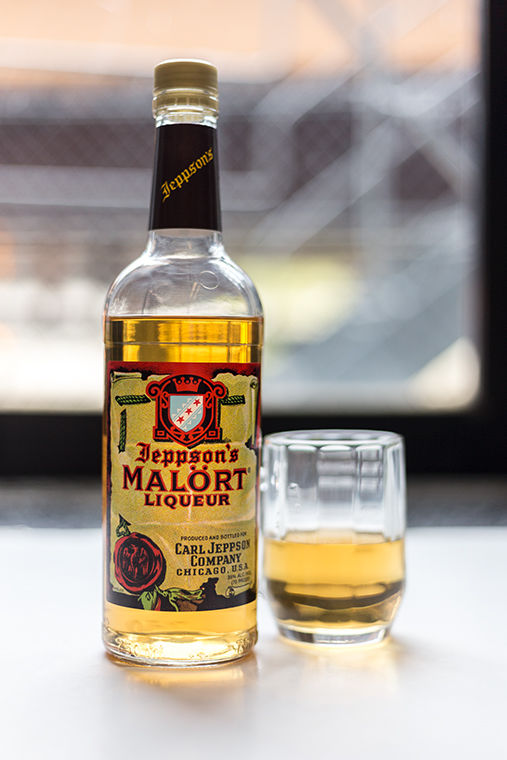Malört ‘grows like a virus’
Malört ‘grows like a virus’
September 5, 2017
Fans call it the “Champagne of pain.” They say it has turned “taste buds into taste foes for generations” and it is “what soap washes its mouth out with.”
But Jeppson’s Malört is also a beloved Chicago staple. The wormwood liqueur has been making curious drinkers recoil in disgust since mass distribution began in 1934; even so, a devoted fanbase reveres the drink for its harsh taste and unusual charm. To this day, its parent company remains in Chicago at 3150 N. Lake Shore Drive.
“[Malört’s] scary reputation is just sort of an introduction,” said Sam Mechling, director of marketing for Jeppson’s Malört. “If our product was consumed solely on the basis of a first-time challenge, we wouldn’t exist. Clearly, there are people that are coming back for more.”
Carl Jeppson, who created Malört, was a Swedish immigrant and owner of a cigar shop near Clybourn who could no longer taste much of anything thanks to his smoking habits. Malört was one of the few consumables that could stimulate his scorched taste buds, according to a fun fact list from Thrillist.
Malört falls into the category of bäsk brännvin, a type of Swedish beverage that translates to “bitter distilled spirit.” Other companies produce bäsk brännvin to capitalize on Malört’s popularity, but the Carl Jeppson Company holds the Malört trademark, Mechling said.
At one time, the Carl Jeppson Company marketed Malört as a drink that only one in 49 men will continue to drink after his first try. Mechling said that number was a ballpark guess made by former Malört owner George Brode, who took over the product and formed the Carl Jeppson Company after Jeppson’s 1949 death.
“[Brode] was definitely a shoot-from-the-hip kind of guy,” Mechling said. “He had a really, really strong kind of gut sensation for what people wanted to hear.”
Malört saw a resurgence once Mechling began marketing the brand online. Since Mechling took over marketing five years ago, sales have increased about threefold, he said.
“It really grows like a virus,” Mechling said. “You’ve got the patient zero, we call it—and there’s just so many of those being born every day. There [is] the person that’s bringing it to the tailgate, the person that’s ordering it at the bar.”
The Carl Jeppson Company also introduced the “MalörtMap,” which shows every bar, liquor and grocery store in the six states where Malört is sold, but the liqueur still lacks an international presence.
{{tncms-inline alignment=”right” content=”<p>"Really, no one has a gray area about Mal&ouml;rt."</p> <p>&mdash;SCOTT GREENE, SECTION 8 CHICAGO CHAIRMAN</p>” id=”cd47a5c3-65f8-4551-b363-1cd97e4cf194″ style-type=”quote” title=”Section 8 quote” type=”relcontent” width=”full”}}
Malört’s fanbase has not come up short of creative ways to show its appreciation, with Hoosier Mama Pie Company developing the “Chicago Sunrise” Malört-and-grapefruit custard pie in March. Other fans have created advertisements and even a meme called “Malört Face,” which shows photos of people before and after trying Malört.
Section 8 Chicago, a fan organization for the Chicago Fire Soccer Club, hosted its fifth Malört 5K Aug. 19 to celebrate the team’s 20th anniversary. Participants swallowed a shot of the biting beverage both before and after the race. A shot of Malört, Mechling said, can act as a “shock to the pistons” to get people going.
After local news outlets including RedEye Chicago and TimeOut Chicago picked up the event this year, it saw a huge attendance spike. In previous years, the 5K had 20–40 runners, but 175 participants braved the bitterness this year, said Scott Greene, Section 8’s chairman.
Greene said Section 8 does not keep the “Champagne of pain” to themselves. When the group travels to out-of-state games with the team, it always has some Malört in supply for other soccer fans to try.
“Really, no one has a gray area about Malört,” Greene said. “It’s either that it’s the worst thing I ever tasted or, ‘Hey, that’s pretty good; I think I’ll have it.’ I really think it is just a repulsive drink.”
That polarity is due in part to the local lore surrounding the drink, said Printers Row Wine Shop employee D.J. Cooper. Malört does not sell well, but it is a necessary addition to any Chicago liquor store’s inventory, he added.
“I don’t get it,” Cooper said. “It’s just one of those initiation nonsense macho things. It’s ridiculous, but it’s part of our culture, so what are you going to do?”








